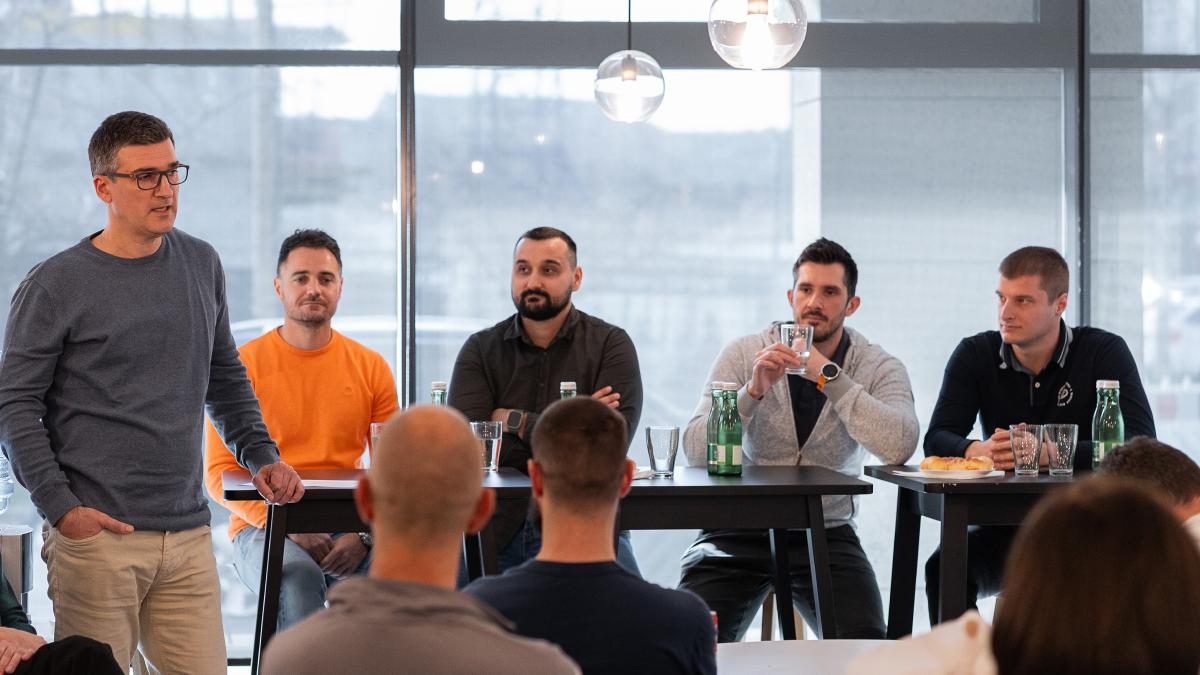“I would say that the three up-to-date trends affecting financial institutions in the Benelux region and every Western European bank are fraud detection, anti-money laundering, and KYC (Know Your Customer). This is where HTEC with its deep knowledge domain and experience in FinTech and digitalising Finanancial services can make a difference.”
Freek Roelofs, Business Development Representative for the Benelux region, has a deep experience in helping companies transform through the power of technology. For more than 25 years of his remarkable career, he has been focusing on accelerating the digital transformation in the financial services industry by using innovative solutions based on people and processes aligned with the right technology.
He joined HTEC’s mission to help financial institutions reinvent the future of finance. We sat down with Freek to discuss what tech can do for the future of Finance and how HTEC fits into this story.
H: What sparked your curiosity to learn and become a part of the world of finance at the first place?
F: “Short answer would be a coincidence. But that’s not completely true. I studied tax law at the university which somehow introduced me to the world of financial services industry. I started my professional journey in this field in the second half of the 90’s when I started to work in the M&A field setting up tax structures for multi nationals. I worked for two service lines, oil and gas on the one hand, and financial services on the other.
Having studied tax law, I eventually moved towards the banking and insurance industry in the Netherlands where I worked for several years from the inside. After that I moved back to the advisory business where I’ve been for more than 25 years now. This helped me get a bigger picture of how these companies work. This, powered up by the knowledge I gained at university, allowed me to clearly understand how financial products work. I grew up in management consulting; moved towards strategy consulting. I love being a consultant and, at the same time, I was more and more attached and inspired by IT items which were popping up in almost every project. Nowadays, this is called digital transformation.”
H: How, in your view, technology empowers financial services?
F: “I strongly believe that technology can help make things simpler. If you can explain what a digital insurance product or a digital banking product is all about to somebody who does not understand how the entire banking system works, it means that technology enables simplicity and simplicity leads to trust. And trust is a major element because if you don’t trust the financial system, if you don’t trust your bank, then the financial industry runs out of business. Simplicity can lead to trust — I have been using this phrase for more than 15 years now.
That’s a reason why I’m fascinated by technology and what digital can do for a financial services company, a bank or insurance company, a pension company, and more specifically, what it can do for me as a consumer. This was the number one reason why I moved to the sector of financial services, and this is where I gained most of my experience over the last 25 years.”
H: You have been involved in insurance to different degrees for many years. What kind of insight does your multi-perspective view provide you about the insurance industry on the Benelux region?
F: “From a Benelux perspective, the insurance industry is years behind, when compared to for example the banking industry on the digital transformation track. If you look at it from an insurance point of view, there are still simply many legacy systems which power insurance companies, not only in the Netherlands, but more is general in Western Europe. For the last 20 years, mergers reduced the number of players significantly. For example in the old days we used to have hundreds of different insurance companies in The Netherlands, nowadays there are four large groups available which manage around 85% of the entire business.
On the other hand, Germany still has hundreds of banks, I strongly believe that in order to please your customer you must speed up your digital transformation and focus at getting your company connected using the right platform technology. This can only be done in an effective way when you become tech savvy at the right speed. ”
H: A recent Deloitte report outlined that hyper-personalisation is “an imperative for banks” and we have seen banking change completely as end-users require personalised digital interactions. From your impressive background, what would you say banks need to do to respond to customer needs, differentiate their brand and boost revenues?
F: “In the country where I live, the Netherlands, we used to have lots of banks, but nowadays we have three large banks, and they offer services to 95% of all the customers in the Netherlands. If you asked my 21-year-old son which bank he would prefer he would say he would choose the one with the best app. They don’t care what’s behind it. They don’t care what the logo is. They don’t care how large or small the company is. They just want the best app, which works because the bank has become an app to them. Everything which is ‘behind the app’ has become a commodity. They just don’t care anymore. And to be honest, I’m sometimes on that level as well.”
What I am trying to say is that personalized digital interactions are imperative. If you want to win as a bank and grow your customer base, you’ve got to have the most beautiful customer experience, app there is. You must integrate the app as soon as possible with every other system available. Let me give you an example. A few weeks ago, I was in Barcelona, with my kids and my wife. I asked my kids where they wanted to eat and I assumed they would google the restaurants or visit TripAdvisor, but they didn’t. They completely shifted to some other platform where you can find such information — TikTok. The point I am trying to make is that, in the next few years, the banking services will be integrated in the social media platforms like Instagram, Facebook, or, even your PlayStation, game console.
So, if you really want to stand out as a digital financial industry company, you have to cater to your customers’ needs, give them what they want and when and where they want it. This is where banks can make a difference. If you want to create the next neobank or the next digital bank, you have to have an internal cloud-based digital platform which can be integrated with any system that will be developed in the next several years. If you look at the latest developments in the UK, Germany, the Netherlands, and banks for example like BUNQ, Revolut and N26 their goal is to make an impression that they are not a bank, but an app which you can use to talk to other platforms and make transactions easily and quickly.”
H: How did your path cross with HTEC?
F: “I met one of your colleagues who connected me to Aleksandar, Sofija and David. And after a few months of having conversations with them, I said to Alex that there is something extraordinary about HTEC that makes me want to explore more, something that makes it stand out from the rest out there. Besides the extraordinary growth the company has experienced over the past two years, HTEC is a team of very inquisitive and curious tech experts and leaders whose passion for solving complexities is contagious.
There are no boundaries or challenges they do not want to solve. Their main drive is getting out of their comfort zone to bring additional value to the clients’ businesses by looking beyond what the solution can bring, making future-proof decisions and exploring ways how to solve some additional challenges that come along the way. I would say that this was one of the main reasons why I decided to join HTEC and so, here I am, talking to you here, today.”
H: What are the strengths and capabilities HTEC can bring to help some of the biggest financial institutions execute their digital transformation strategies?
F: “I would say that the three up-to-date trends affecting every Western European bank are fraud detection, anti-money laundering, and KYC (Know Your Customer). This is where HTEC with its deep knowledge domain and experience in FinTech and digitalising Finanancial services can make a difference.”
H: What do you consider to be the most important lessons learned on your career path so far?
F: “There are lots of important lessons, but I’ll give you one for now. As a professional, you have to make decisions on a daily basis. Now, you can make decisions on three levels, using either your brain, by following your heart, or go after your gut feeling. The most important decisions I have made in the last 50 plus years were based on my gut feeling. I honestly believe that in those hard times, when you are racking your brain which way to go, what side to choose, just follow your gut feeling. It has never let me down.”
Where to Start?
At HTEC, we are focused on building solutions that will help financial institutions reimagine their processes, prepare for tomorrow’s demands and get to the future first. Reach out to our team of experts or book a chat with our Freek Roelofs to learn how we can help you drive the future of finance.






